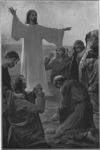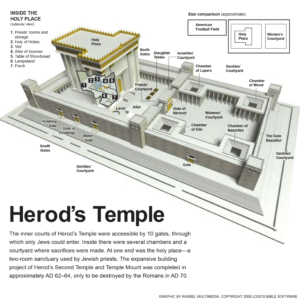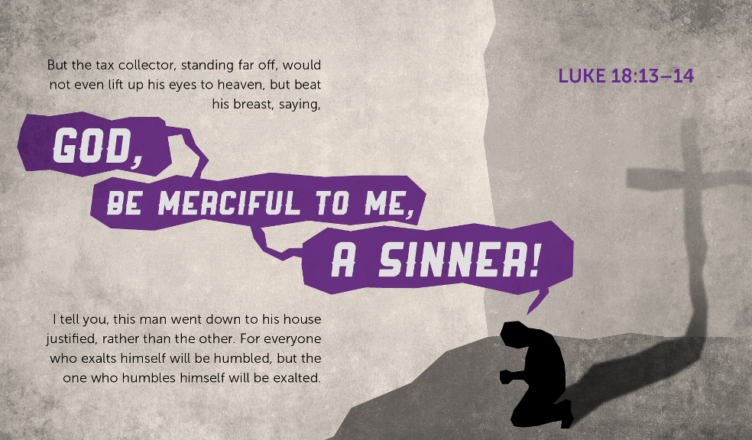From Luke 17-18
 Today’s reading includes a passage that says a few things about pride, condemnation, repentance and justification. Its the parable of the Pharisee and the Tax Collector. Do you think Jesus would whisper this parable in your ear?
Today’s reading includes a passage that says a few things about pride, condemnation, repentance and justification. Its the parable of the Pharisee and the Tax Collector. Do you think Jesus would whisper this parable in your ear?
This post is part of my bible in a year series.
Passage and Comments
Luke records another parable of Jesus. The parable begins explaining that Jesus only told this parable to a select few.
9 He also told this parable to some who trusted in themselves that they were righteous, and treated others with contempt: (Lk 18.9)
Jesus didn’t tell this parable to everyone. Only on a select few did he use this and he did it with strong reason. He told the parable to those who;
- trusted in themselves that they were righteous, and
- treated others with contempt.
What does it mean to treat others with contempt?
Jesus told this parable to these select people to criticise their self-assurance and contemptuous treatment of others. Hopefully to get them to change the way they view themselves and the way they treated others.
10 “Two men went up into the temple to pray, one a Pharisee and the other a tax collector. (Lk 18.10)

Both of these men came to the temple. The temple is the place where the Jews worshiped God, prayed and in particular offered sacrifices to make atonement for their sins.
Pharisees were the religious hero’s of first century Israel. People looked up to them. They were devout, serious about God, lived according to the Jewish law and sought other Jews to do the same.
Tax Collectors were the opposite. They worked for Rome (the resented foreign power ruling over the Jews) and went door to door, person to person, collecting tax. Of which they gave most to Rome and some to themselves. Because they worked for Rome and because they took money away from others, people generally feared and hated them.
11 The Pharisee, standing by himself, prayed thus: ‘God, I thank you that I am not like other men, extortioners, unjust, adulterers, or even like this tax collector. 12 I fast twice a week; I give tithes of all that I get.’ (Lk 18:11-12)

The Pharisee stands alone praying because no one wants to stand with him.
He starts off thanking God by elevating himself above others whom he identifies by their sins. His prayer reveals his proud heart. As Jesus says, he looks down on people with contempt, including a certain tax collector.
The Pharisee’s describes his behaviour as above and beyond that required by the law of Moses.
Essentially the Pharisee is saying, ‘God, look at how great I am compared to these other lowlifes’. Why is he even in the temple? He was in the wrong place.
What is the tax collector doing in the temple?
13 But the tax collector, standing far off, would not even lift up his eyes to heaven, but beat his breast, saying, ‘God, be merciful to me, a sinner!’ (Lk 18:13)
The tax collector had sometime before recognised his sin. He had come to the temple to repent for his wrongdoing and seek mercy from God. He came to the right place.
14 I tell you, this man [the repentant tax collector] went down to his house justified, rather than the other [the self righteous and contemptuous Pharisee].
For everyone who exalts himself will be humbled, but the one who humbles himself will be exalted.” (Lk 18:14)
Jesus says the tax collector went home justified, not the Pharisee. The irony is – the person who thought he was right with God – wasn’t. The person who thought he wasn’t right with God – became so. Jesus performs a role reversal (v14).
The tax collector became righteous in the eyes of God. We can assume he repented of his sins and resolved not to continue in them. This is the start of his new life with God. A changed life requires fruit. We could assume he made some serious changes in the way he resolved to live, perhaps he ceased to be a tax collector at that point.
Jesus says the Pharisee was not justified. The Pharisee treated others with contempt and was blindly oblivious to his own arrogance and pride. Jesus’ parable is intended to highlight this to those he speaks to. These are ways in which people can come under God’s future judgment and condemnation (Jas 5.8-12).
So in the context of the gospel, Jesus told this parable to people like the Pharisee to stop them from bragging about how great they are and treating others with contempt. They need to repent of their own pride and the way they treat others.
General Points about Application
Jesus only spoke this parable to some people.
All people can succumb to pride and treat others with contempt like the Pharisee. But that doesn’t mean all people are behaving this way. We need to keep in mind Jesus didn’t share it with all people. He only targeted some people (Lk 18.9). Jesus’ target audience and application ought to influence how we apply it to general audiences.
All have sinned, but God’s people have been forgiven and they don’t keep on sinning (1 Jn 3.6-10; 1 Cor 15.34; Rom 6.1-2). They resist sin, pray to God to avoid temptation (1 Cor 10.13). Ongoing sin in the life of someone is an indication they are not a believer (Rom 14.23). The New Testament properly describes believers as Saints rather than Sinners. Consequently its not the intention of Jesus or the Luke (the author of the gospel) to encourage believers to identify with the tax collector.
We can learn more from the parable. We need to remember who is humbling who. At the end Jesus humbles those who exalt themselves and exalts those who humble themselves (cf. Mt 23.12; Lk 14.11).
Jesus instructs us to humble ourselves.
Its always a good idea to humble yourself before God. He is a lot bigger, more loving and holy than we will ever be. The warning for all of us is to beware pride and exalting ourselves above others, because at some point in time all people who do so will be humbled.
The parable also envisages another situation where people who have led sinful lifestyles are in the process of coming to Jesus. How will existing and long term followers of Jesus treat them? Like the Pharisee treated the tax collector, of the way Jesus welcomed them and many prostitutes (Mt 21.31).
This would have been a real issue because Jesus had a heart for sinners, prostitutes and tax collectors. Many of them entered the kingdom before the Jewish leaders. When after meeting Jesus, they sincerely repented of their sin and desired to follow him, how should they then be received by Jesus’ long term followers? When someone recognises their sin and turns to Jesus we should rejoice and not treat them with contempt.
About Jesus
Jesus opposes the self righteous who treat others with contempt. He recognises that God is merciful and forgives sinners who come to him. God’s forgiveness and mercy restores them to righteousness.
The main point from this passage for non-believers:
God has mercy on repenting sinners who trust in Jesus and come to him.
You should come to him and turn from any sin and wrongdoing you may be indulging in. Then follow Jesus by listening to what he says.
The main point from this passage for believers:
Believers should be warned against being like the Pharisee. Keep checking yourself to see if you are proud and treat others with contempt. We all can be unaware of our own issues and can still fall into sin ourselves.
Make a consistent practice of humbling yourself before the LORD.
Believers also need to be prepared to welcome former sinners who have repented of their sin, now trust in Jesus and follow him.
Copyright © Joshua Washington and thescripturesays, 2014-20. All Rights Reserved.


